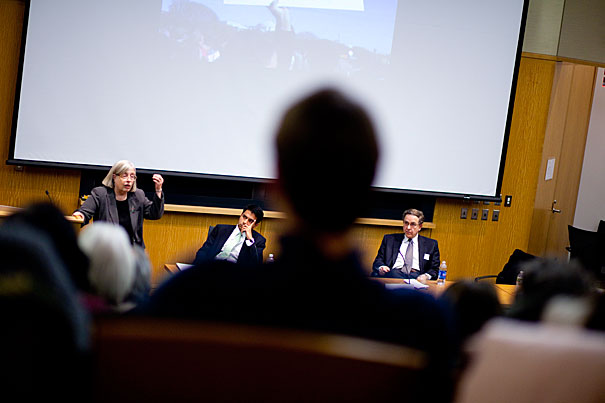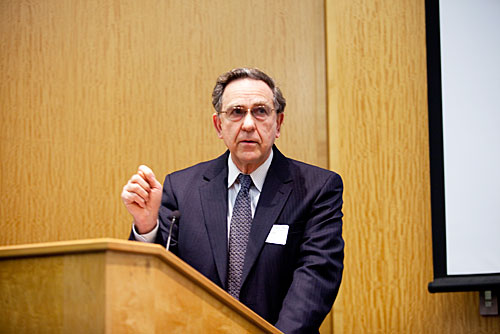
Theda Skocpol (from left) of Harvard University, Amitabh Chandra of Harvard Kennedy School, and Paul Starr of Princeton University spoke at a Harvard Kennedy School panel discussion on the impact, failures, and future of health care reform.
Photos by Rose Lincoln/Harvard Staff Photographer
Chronic condition
Panelists see no let-up in health care debate
The signing of the Patient Protection and Affordable Care Act by President Obama on March 23, 2010 in no way ended the debate over health care reform, and the issue may be a big factor in the next presidential election.
During a Harvard Kennedy School discussion Wednesday (Feb. 23), those points were underscored by predictions of action in Congress and the Supreme Court and disagreement among panelists over the impact of the legislation.
“A year ago, it seems as though this country had reached some kind of resolution in this long and rancorous conflict over health care in this country,” said Paul Starr, professor of sociology and public affairs at Princeton University and co-editor of The American Prospect. “But whether the legislation really resolved anything at all seems unclear. The conflict goes on and it’s as bitter as ever.”
The panel, sponsored by the Multidisciplinary Program in Inequality and Social Policy, focused on one of the act’s least popular and most problematic aspects — the mandate that people buy health insurance.
Starr said that the law should have allowed individuals to opt out of the mandate as long as it didn’t allow them to opt back in whenever they wanted. He suggests that a person could, for example, opt out if he or she waives the right to get back in for five years.
“The mandate communicates the wrong message,” he said. “Many people simply do not understand why the government should fine them for failing to purchase health insurance when it does not require them to buy other products.”
Yet if you don’t buy insurance, what will happen?
“Actually nothing,” Starr said. The mandate is difficult to enforce, he said. A person might get a warning letter from the Internal Revenue Service, but “The IRS can’t garnish your wages; it cannot put a lien on your property. And there are no criminal penalties for refusal to pay.
“The law ultimately relies on a norm of law abidingness,” he added.
Still, the act is a “remarkable milestone,” comparable to the Social Security Act of 1935 and the expansion of Medicare in 1965, said Theda Skocpol, the Victor S. Thomas Professor of Government and Sociology and co-author of “Health Care Reform and American Politics: What Everyone Needs to Know.”
Downplaying the impact of the individual mandate, which she called a “toothless tiger,” Skocpol said the act “sets up new rules of the game for private insurance industry, which says they can continue to make profits but must do so by expanding the ranks of patients they serve.”
The act expands Medicare and Medicaid and delivers more care to more people. Liberals may lament the lack of a public option but the law is a major redistributive piece of social legislation, she said. Moreover, even if the mandate were eliminated, “the hatred of the law would still be there,” she said.
A crucial element of the bill is that it requires states to set up exchanges on which private insurance policies will be compared and sold. States may complain about the law “but they are also taking the [federal] money to plan the insurance exchanges,” Skocpol said.

Panel moderator Amitabh Chandra, an economist and Harvard Kennedy School professor of public policy, said that while he supports the act, it does little to improve the actual quality of health care or to curb rising medical costs. “This is a fiscal train wreck waiting to happen,” he added.
Chandra cited expensive medical technology that increases costs but which can’t be denied to patients under the act; to drive home the point, he showed a cartoon of patient bodies as human ATM machines for doctors.
The panelists noted that academics are buzzing about possible action by the U.S. Supreme Court on the act, but Skocpol predicts the high court will shrewdly delay taking any action until after the 2012 election, saying, “They’re in a position to stall.”
But Democrats, whether they like it or not, will be forced to defend the bill in the next election cycle, Starr said. On the other side of the aisle, Mitt Romney, a possible Republican presidential candidate who oversaw health care reform at the state level as governor of Massachusetts, will be hard-pressed to “attack Obama care when it is, in fact, Romney care,” Skocpol said.
During the question-and-answer period, Arnold S. Relman, former editor-in-chief of the New England Journal of Medicine, challenged panelists, saying the powerful health insurance lobby was critical in maintaining the mandate.
Starr, however, countered that the health insurance industry did not support the act. In fact, the five largest companies spent $80 million through the U.S. Chamber of Commerce to oppose it, he said.
Skocpol said that the politics that lead to a law are not the same as politics that emerge from a law. “The Tea Party crowd and the insurance company crowd will come to blows” about the act, she predicted.





